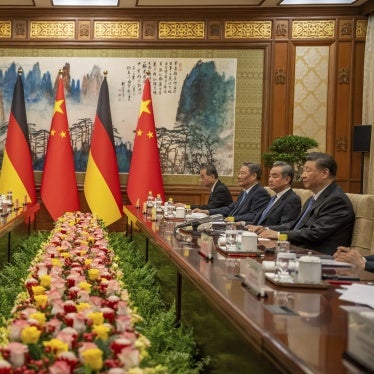To many Australians, Sri Lanka means one of two things: the home of “boat people” or an exotic beach holiday destination.
Sri Lanka’s idyllic palm-fringed beaches with new tourist resorts give no inkling of the country’s grim recent history: a nearly three-decades-long, brutal and bloody conflict that ended almost five years ago with the defeat of the Liberation Tigers of Tamil Eelam, known as the Tamil Tigers. The UN estimates that up to 40,000 civilians may have died during final months of fighting. Persistent allegations of war crimes committed by both sides refuse to go away. Thousands of“disappearances” remain unresolved.
There is a chance for Australians to show leadership on the topic of human rights and justice in Sri Lanka. On 26 March, the United Nations Human Rights Council in Geneva will vote on a resolution about the human rights situation in Sri Lanka.
Australia has taken the position that cosying up to the government of president Mahinda Rajapaksa is the best way to stop the flow of asylum seekers. Instead, Australia has a chance to demonstrate its concern for the Sri Lankan victims of its long and deadly civil war by co-sponsoring the resolution.
The recent civil war, disappearances and the lack of justice has knock-on effects for the current situation in the country — the Rajapaksa government has consolidated its rule by weakening institutions providing checks on power, installing a stifling military presence in the ethnic Tamil-majority Northern Province, and intimidating and harassing those who criticize the government.
On 16 March, police arrested two prominent rights defenders, Ruki Fernando and Father Praveen Mahesan, a Catholic priest. Both were released without charge after 48 hours in custody, but only as a result of intense international and domestic pressure. This repression and continued human rights violations — including torture and rape in custody of suspected Tamil Tiger supporters — are just some of the reasons why some Sri Lankans risk their lives and get on boats to flee the country.
The lack of accountability for abuses has driven the US, UK, Montenegro, and Mauritius to table a resolution seeking an international inquiry mechanism led by the office of the UN High Commissioner for Human Rights into alleged violations of wartime abuses by both sides. Australia is not a council member, and thus cannot vote, but it can lend diplomatic support through co-sponsoring the resolution. In 2012 and 2013, Australia did so. So far, on the current text, the Australian government has been shamefully noncommittal.
Recent gestures by the Australian government do not bode well. The difference between Tony Abbott and UK prime minister David Cameron at last year’s Commonwealth Heads of Government Meeting in Colombo were startling.
Cameron used the opportunity to publicly raise human rights abuses, visiting war-affected communities in the north, and had a frank exchange with President Rajapaksa over accountability for war crimes. By contrast, Abbott gifted two patrol boats to the Sri Lankan navy, went jogging with one of Rajapaksa’s sons, and commended the government for its progress.
When asked by the media about reports of torture, he effectively sanctioned the practice, saying “in difficult circumstances, difficult things happen.”
Last month, speaking at the Sri Lankan High Commission, foreign minister Julie Bishop said “to those who say isolate Sri Lanka, I say engage with Sri Lanka.” Indeed, principled engagement is needed, as Cameron showed. But it would be wrong to cast the UN resolution as an isolationist measure. Rather it is a step to help Sri Lanka — and the victims and their families — by providing an independent, factual account of alleged violations by both parties to the conflict.
Bishop rightly has urged the Sri Lankan government to implement the recommendations of its Lessons Learnt and Reconciliation Commission, a domestic mechanism set up in response to international pressure to address accountability issues. The commission issued recommendations in 2011. The two past Human Rights Council resolutions, co-sponsored by Australia in 2012 and 2013, have also called upon the government to implement these recommendations, but the Sri Lankan government has displayed no political will to do so.
Concerned governments have been patient with Sri Lanka. Now is the time for Australia to join other countries in upping the pressure on Sri Lanka by ensuring what the government steadfastly refuses to do. Australia’s foreign policy seems fixated with policies that prevent asylum seekers from reaching its shores. In the long term, what would be more effective is using the right mix of public and private pressure and concerted international action to stop countries like Sri Lanka from committing the abuses that cause people to flee.
Australia is bidding for a seat on the Human Rights Council in 2018. If it’s serious about its bid, it needs to show leadership and be more proactive in addressing human rights crises in the region, rather than sitting back and letting other countries take the lead and the heat for raising abuses.







